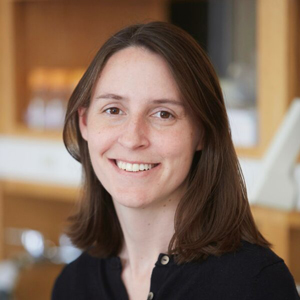
Mary Dunlop
Associate Professor and Graduate Chair, Biomedical Engineering
Boston University
Optogenetic Feedback Control of Gene Expression and Antibiotic Resistance in Single Cells
January 9
4:00–5:00 p.m.
Physics/Astronomy Auditorium A110
Abstract
Cell-to-cell heterogeneity in gene expression can elevate antibiotic resistance in one microbe while other cells remain susceptible. These transient forms of drug resistance are often stochastic and dynamic, leading to single-cell level differences in resistance that change with time. To date, methods for quantifying these effects have relied on careful observations of native expression patterns. In this talk, I will discuss a novel approach for controlling gene expression dynamics in single cells that can be used to precisely drive expression in thousands of cells in parallel.
In support of this, I will discuss our recent advances in automated image processing of time-lapse microscopy data using deep learning models (DeLTA). Once trained, the DeLTA algorithm requires minimal input from the user and can rapidly segment, track, and reconstruct lineages for bacteria growing in microfluidic chips and on two dimensional surfaces. I will also discuss optogenetic control methods that allow us to use light-based feedback to regulate gene expression in real time. Using a combination of deep learning-based models and rapid image analysis, we can simultaneously control gene expression in thousands of cells in parallel.
Together, these approaches offer powerful methods that can be used to quantify and control cell-to-cell heterogeneity in antibiotic resistance, providing a detailed view into strategies bacteria can use to evade drug treatment.
Bio
Mary Dunlop is an Associate Professor of Biomedical Engineering at Boston University with additional appointments in Bioinformatics and in the Molecular Biology, Cell Biology & Biochemistry program. She graduated from Princeton University with a B.S.E. in Mechanical and Aerospace Engineering and a minor in Computer Science. She then received her Ph.D. from the California Institute of Technology, where she studied synthetic biology with a focus on dynamics and feedback in gene regulation.
As a postdoctoral scholar, she conducted research on biofuel production at the Department of Energy's Joint BioEnergy Institute. Her lab engineers novel synthetic feedback control systems and also studies naturally occurring examples of feedback in gene regulation. In recognition of her outstanding research and service contributions, she has received many honors including a DOE Early Career Award, an NSF CAREER Award, the ACS Synthetic Biology Young Investigator Award, and an NSF Transitions Award. She is also the recipient of several teaching awards, including Boston University’s Biomedical Engineering Professor of the Year Award (2019) and the College of Engineering Teaching Excellence Award (2020).